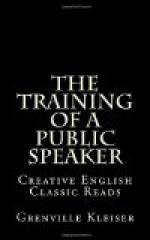As to the rest, tho we might measure our age, not by the space of more advanced years, but by the time of youth, we should find that we had quite years enough for learning, all things being made shorter by order, method, and the manner of application. To bring the matter home to our oratorical studies, of what significance is the custom which I see kept up by many, of declaiming so many years in schools, and of expending so much labor on imaginary subjects, when in a moderate time the rules of eloquence may be learned, and pursuant to their directions, a real image framed of the contests at the bar? By this I do not mean to hint in the least that exercises for speaking should ever be discontinued, but rather that none should grow old in any one particular exercise for that purpose, for we may require the knowledge of many sciences, and learn the precepts of morality, and exercise ourselves in such causes as are agitated at the bar, even while we continue in the state of scholars. And indeed the art of oratory is such as need not require many years for learning it. Each of the arts I have mentioned may be abridged into few books, there being no occasion to consider them so minutely and so much in detail. Practise remains, which soon makes us well skilled in them. Knowledge of things is increasing daily, and yet books are not so many; it is necessary to read in order to acquire this knowledge, of which either examples as to the things themselves may be met with in history, or the eloquent expression of them may be found in orators. It is also necessary that we should read the opinions of philosophers and lawyers, with some other things deserving of notice.
TAKING TIME FOR STUDY
All this indeed may be compassed, but we ourselves are the cause of our not having time enough. How small a portion of it do we allot to our studies! A good part of it is spent in frivolous compliments and paying and returning visits, a good part of it is taken up in the telling of idle stories, a good part at the public spectacles, and a good part in the pleasures of the table. Add to these our great variety of amusements, and that extravagant indulgence we bestow upon our bodies. One time we must go on a course of travels, another time we wish recreation amidst the pleasures of rural life, and another time we are full of painful solicitude regarding the state of our fortune, calculating and balancing our loss and gain; and together with these, how often do we give ourselves up to the intoxication of wine, and in what a multiplicity of voluptuousness does our profligate mind suffer itself to be immersed? Should there be an interval for study amidst these avocations, can it be said to be proper? But were we to devote all this idle or ill-spent time to study, should we not find life long enough and time more than enough for becoming learned? This is evident by only computing the time of the day, besides the




